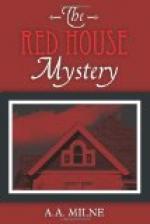“Well, but, auntie, he hasn’t been here for fifteen years. I heard Mr. Mark telling Mr. Cayley. ‘Fifteen years,’ he says. Mr. Cayley having arst him when his brother was last in England. Mr. Cayley knew of him, I heard him telling Mr. Beverley, but didn’t know when he was last in England—see? So that’s why he arst Mr. Mark.”
“I’m not saying anything about fifteen years, Audrey. I can only speak for what I know, and that’s five years Whitsuntide. I can take my oath he’s not set foot in the house since five years Whitsuntide. And if he’s been in Australia, as you say, well, I daresay he’s had his reasons.”
“What reasons?” said Audrey lightly.
“Never mind what reasons. Being in the place of a mother to you, since your poor mother died, I say this, Audrey—when a gentleman goes to Australia, he has his reasons. And when he stays in Australia fifteen years, as Mr. Mark says, and as I know for myself for five years, he has his reasons. And a respectably brought-up girl doesn’t ask what reasons.”
“Got into trouble, I suppose,” said Audrey carelessly. “They were saying at breakfast he’d been a wild one. Debts. I’m glad Joe isn’t like that. He’s got fifteen pounds in the post-office savings’ bank. Did I tell you?”
But there was not to be any more talk of Joe Turner that afternoon. The ringing of a bell brought Audrey to her feet—no longer Audrey, but now Stevens. She arranged her cap in front of the glass.
“There, that’s the front door,” she said. “That’s him. ’Show him into the office,’ said Mr. Mark. I suppose he doesn’t want the other ladies and gentlemen to see him. Well, they’re all out at their golf, anyhow—Wonder if he’s going to stay—P’raps he’s brought back a lot of gold from Australia—I might hear something about Australia, because if anybody can get gold there, then I don’t say but what Joe and I—”
“Now, now, get on, Audrey.”
“Just going, darling.” She went out.
To anyone who had just walked down the drive in the August sun, the open door of the Red House revealed a delightfully inviting hall, of which even the mere sight was cooling. It was a big low-roofed, oak-beamed place, with cream-washed walls and diamond-paned windows, blue-curtained. On the right and left were doors leading into other living-rooms, but on the side which faced you as you came in were windows again, looking on to a small grass court, and from open windows to open windows such air as there was played gently. The staircase went up in broad, low steps along the right-hand wall, and, turning to the left, led you along a gallery, which ran across the width of the hall, to your bedroom. That is, if you were going to stay the night. Mr. Robert Ablett’s intentions in this matter were as yet unknown.




